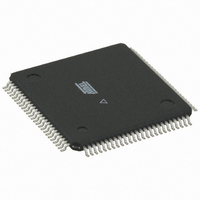ATMEGA3250PV-10AU Atmel, ATMEGA3250PV-10AU Datasheet - Page 5

ATMEGA3250PV-10AU
Manufacturer Part Number
ATMEGA3250PV-10AU
Description
IC MCU AVR 32K FLASH 100-TQFP
Manufacturer
Atmel
Series
AVR® ATmegar
Datasheet
1.ATMEGA3250P-20AU.pdf
(364 pages)
Specifications of ATMEGA3250PV-10AU
Core Processor
AVR
Core Size
8-Bit
Speed
10MHz
Connectivity
SPI, UART/USART, USI
Peripherals
Brown-out Detect/Reset, POR, PWM, WDT
Number Of I /o
69
Program Memory Size
32KB (16K x 16)
Program Memory Type
FLASH
Eeprom Size
1K x 8
Ram Size
2K x 8
Voltage - Supply (vcc/vdd)
1.8 V ~ 5.5 V
Data Converters
A/D 8x10b
Oscillator Type
Internal
Operating Temperature
-40°C ~ 85°C
Package / Case
100-TQFP, 100-VQFP
Processor Series
ATMEGA32x
Core
AVR8
Data Bus Width
8 bit
Data Ram Size
2 KB
Interface Type
SPI, UART, USI
Maximum Clock Frequency
10 MHz
Number Of Programmable I/os
69
Number Of Timers
3
Maximum Operating Temperature
+ 85 C
Mounting Style
SMD/SMT
Minimum Operating Temperature
- 40 C
On-chip Adc
10 bit, 8 Channel
Data Rom Size
1 KB
Operating Supply Voltage
1.8 V to 5.5 V
Operating Temperature Range
- 40 C to + 85 C
A/d Bit Size
10 bit
A/d Channels Available
8
Height
1 mm
Length
14 mm
Supply Voltage (max)
5.5 V
Supply Voltage (min)
1.8 V
Width
14 mm
For Use With
ATSTK600-TQFP100 - STK600 SOCKET/ADAPTER 100-TQFP770-1007 - ISP 4PORT ATMEL AVR MCU SPI/JTAG770-1005 - ISP 4PORT FOR ATMEL AVR MCU JTAG770-1004 - ISP 4PORT FOR ATMEL AVR MCU SPIATAVRISP2 - PROGRAMMER AVR IN SYSTEMATSTK504 - STARTER KIT AVR EXP MOD 100P LCD
Lead Free Status / RoHS Status
Lead free / RoHS Compliant
Other names
ATMEGA3250PV-8AU
ATMEGA3250PV-8AU
ATMEGA3250PV-8AU
Available stocks
Company
Part Number
Manufacturer
Quantity
Price
- Current page: 5 of 364
- Download datasheet (6Mb)
2.2
8023F–AVR–07/09
Comparison between ATmega325P and ATmega3250P
The ATmega325P/3250P provides the following features: 32K bytes of In-System Programma-
ble Flash with Read-While-Write capabilities, 1K bytes EEPROM, 2K byte SRAM, 54/69 general
purpose I/O lines, 32 general purpose working registers, a JTAG interface for Boundary-scan,
On-chip Debugging support and programming, three flexible Timer/Counters with compare
modes, internal and external interrupts, a serial programmable USART, Universal Serial Inter-
face with Start Condition Detector, an 8-channel, 10-bit ADC, a programmable Watchdog Timer
with internal Oscillator, an SPI serial port, and five software selectable power saving modes. The
Idle mode stops the CPU while allowing the SRAM, Timer/Counters, SPI port, and interrupt sys-
tem to continue functioning. The Power-down mode saves the register contents but freezes the
Oscillator, disabling all other chip functions until the next interrupt or hardware reset. In Power-
save mode, the asynchronous timer, allowing the user to maintain a timer base while the rest of
the device is sleeping. The ADC Noise Reduction mode stops the CPU and all I/O modules
except asynchronous timer and ADC, to minimize switching noise during ADC conversions. In
Standby mode, the crystal/resonator Oscillator is running while the rest of the device is sleeping.
This allows very fast start-up combined with low-power consumption.
The device is manufactured using Atmel’s high density non-volatile memory technology. The
On-chip In-System re-Programmable (ISP) Flash allows the program memory to be repro-
grammed In-System through an SPI serial interface, by a conventional non-volatile memory
programmer, or by an On-chip Boot program running on the AVR core. The Boot program can
use any interface to download the application program in the Application Flash memory. Soft-
ware in the Boot Flash section will continue to run while the Application Flash section is updated,
providing true Read-While-Write operation. By combining an 8-bit RISC CPU with In-System
Self-Programmable Flash on a monolithic chip, the Atmel ATmega325P/3250P is a powerful
microcontroller that provides a highly flexible and cost effective solution to many embedded con-
trol applications.
The ATmega325P/3250P AVR is supported with a full suite of program and system develop-
ment tools including: C Compilers, Macro Assemblers, Program Debugger/Simulators, In-Circuit
Emulators, and Evaluation kits.
The ATmega325P and ATmega3250P differs only in memory sizes, pin count and pinout.
2-1 on page 5
Table 2-1.
Device
ATmega325P
ATmega3250P
summarizes the different configurations for the four devices.
Configuration Summary
Flash
32K bytes
32K bytes
EEPROM
1K bytes
1K bytes
RAM
2K bytes
2K bytes
ATmega325P/3250P
General Purpose
I/O Pins
54
69
Table
5
Related parts for ATMEGA3250PV-10AU
Image
Part Number
Description
Manufacturer
Datasheet
Request
R

Part Number:
Description:
Manufacturer:
Atmel Corporation
Datasheet:

Part Number:
Description:
IC AVR MCU 32K 16MHZ 100TQFP
Manufacturer:
Atmel
Datasheet:

Part Number:
Description:
IC AVR MCU 32K 16MHZ 100TQFP
Manufacturer:
Atmel
Datasheet:

Part Number:
Description:
MCU AVR 32K FLASH 16MHZ 100TQFP
Manufacturer:
Atmel
Datasheet:

Part Number:
Description:
Atmega3250 8-bit Microcontroller With In-system Programmable Flash
Manufacturer:
ATMEL Corporation

Part Number:
Description:
Manufacturer:
Atmel Corporation
Datasheet:

Part Number:
Description:
IC AVR MCU 32K 16MHZ 64-QFN
Manufacturer:
Atmel
Datasheet:

Part Number:
Description:
IC AVR MCU 32K 16MHZ 64TQFP
Manufacturer:
Atmel
Datasheet:

Part Number:
Description:
IC AVR MCU 32K 16MHZ 64TQFP
Manufacturer:
Atmel
Datasheet:

Part Number:
Description:
IC AVR MCU 32K 16MHZ 64-QFN
Manufacturer:
Atmel
Datasheet:

Part Number:
Description:
8-bit Microcontroller with In-System Programmable Flash
Manufacturer:
ATMEL [ATMEL Corporation]
Datasheet:

Part Number:
Description:
MCU AVR 32K FLASH 16MHZ 64TQFP
Manufacturer:
Atmel
Datasheet:

Part Number:
Description:
MCU AVR 32K FLASH 16MHZ 64QFN
Manufacturer:
Atmel
Datasheet:











